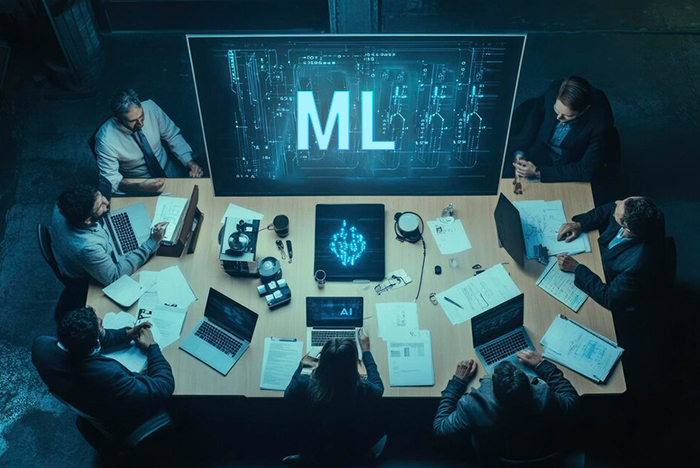Machine Learning (ML) in the dynamic business of 2025 is quickly moving towards the core of innovation and competitive advantage and to the mainstream area formerly occupied by niche technology. Companies in every industry are using ML to learn more about their data, automate complicated tasks, enhance customer experiences by making them personalized, and help them better predict the future. Nevertheless, the complexity of creating, releasing, and sustaining efficient ML solutions requires the knowledge or narrow field skills. Partnering with an ML development company is the most strategic idea to many organizations.
With the enormous population of highly-skilled professionals, state-of-the-art technological prowess and cost-efficient rates, India has become a worldwide powerhouse of exquisite ML development services. This is why the decision to select an ML development company in India is quite possible and actually quite popular. However, the market has many players in this sector so it may be difficult to make the appropriate designation. The information that is presented in detail will offer 5 such important tips that you should use in order to find the best ML development partner that best fits your business requirements.
Top 5 Tips to Select ML development Company
To successfully implement Machine Learning, technical skills are not enough, you need to have an in-depth knowledge of your business, an imaginative vision, and a working partnership. These five tips will assist in coming up with an informed choice.
Tip 1: Clarify Definition of Your Business Problem and Data Landscape
The first and most important thing you should take care of before you even commence the process of searching the ML development company is to get a complete clarity about the purpose of use of ML and what you anticipate ML in doing. The use of ML is a method to address the certain problems, but not a solution.
Define the Core Business Problem: What is the particular challenge or opportunity you are attempting to solve? Be specific. Rather than "we need ML to operate better," define: "we need ML to forecast equipment failure 2 weeks ahead to decrease downtime by 30%," or "we need ML to offer personalized product suggestions to boost average order value by 15%." A clearly defined problem will drive the entire development process.
Know Your Data: Data is the lifeblood of ML. You must understand your data environment in depth:
-
Data Availability: What data you are collecting right now? Where is it kept?
-
Data Volume & Variety: How much data (e.g., gigabytes, terabytes) do you have? Is it structured (databases, spreadsheets) or unstructured (text, pictures, audio, video)?
-
Data Quality: How clean and reliable is your data? Is it complete, consistent, and free from biases? Be frank about your data quality, as it directly affects model performance. A good ML development company will place high importance on data quality and provide data engineering services.
-
Data Accessibility: Can the data be easily accessed and integrated by external partners?
-
Define Measurable Success Metrics: How will you quantify success for the ML solution? These should be measurable and directly related to your business objectives. For instance, "a 10% decrease in customer churn," "a 25% increase in lead conversion rates," or "a 5% improvement in operational efficiency."
Set Budget & Timeline: Have a clear concept of your investment and the wanted project timeline. ML projects may have iterations, and a quality company will assist you in setting expectations.
Why this is important: Without a well-defined problem statement and familiarity with your data, you risk developing an ML solution that does not address a genuine business issue, or one that will not be effectively trainable because the available or quality of data is inadequate. It also enables prospective ML development firms to make accurate quotes and exhibit pertinent expertise.
Tip 2: Opt for Demonstrated Technical Expertise and an Appropriate Technology Stack
The quality of your ML solution depends on the technical acumen of the development company. Move beyond generic statements and explore their individual capabilities.
Deep ML and AI Expertise: Make sure they have a solid grasp of different ML paradigms (supervised, unsupervised, reinforcement learning), deep learning, Natural Language Processing (NLP), Computer Vision, and possibly Generative AI, depending on your requirements. Inquire about their experience in particular algorithms and models applicable to your challenge (e.g., recommender systems, predictive models, anomaly detection).
Core ML Technologies Expertise
Programming Languages: Python is the de facto language of ML. Ask them to verify their proficiency with Python and its essential libraries (NumPy, Pandas, Scikit-learn, Matplotlib).
ML Frameworks: The must-haves for developing and training models. Check for familiarity with TensorFlow, PyTorch, Keras.
Cloud ML Platforms: The majority of scalable ML solutions use the cloud. Check their experience with AWS SageMaker, Google Cloud AI Platform, Microsoft Azure Machine Learning, and their ecosystems. This shows that they can create enterprise-grade, scalable solutions.
Data Engineering & MLOps Capabilities: ML is not merely creating a model; it's about deploying and keeping it running.
Data Engineering: Are they capable of managing the full data pipeline – from data ingestion, cleaning, transform, and feature engineering to the construction of solid data lakes or warehouses? High-quality data pipelines are essential for successful ML.
MLOps (Machine Learning Operations): This is becoming more important for production-grade ML. Inquire about their MLOps practices: how they handle model versioning, deployment, continuous integration/continuous delivery (CI/CD) for ML pipelines, and consistent model monitoring (for drift and decay).
Security & Scalability: Explain how they address data security, privacy, and compliance (for example, GDPR, HIPAA). Make sure they design solutions that are scalable to manage increasing data volumes and changing business needs.
Why it matters: An organization with a solid, applicable technical basis guarantees that your ML solution is done properly with best practices, is highly performant, secure, and able to evolve as your needs change. If you need an ML development firm in India, there are a number of these organizations that do this well, frequently being certified and having specialized staff.
Tip 3: Assess Industry-Specific Experience and Concrete Case Studies
Although technical expertise is essential, an ML development organization that knows your domain will be able to drive the project much faster and provide more suitable solutions.
Domain Expertise: Has the firm done similar ML projects in your particular industry (e.g., finance, healthcare, retail, logistics, manufacturing, telcos)? Industry experience implies they know the specific challenges, regulations, data idiosyncrasies, and typical use cases applicable to your industry. This lowers the learning curve and results in more focused solutions.
Case Studies with Quantifiable ROI: Don't merely review a list of previous work. Ask for in-depth case studies that clearly identify ML projects. For every case study, ask:
The business issue solved.
The particular ML algorithms and models applied.
The challenges faced and how they were resolved.
Most importantly, the measurable business results obtained (e.g., "30% decrease in operational expense," "10% increase in conversion rates," "95% accuracy in anomaly detection").
Client References: Request contact details of former clients, especially those belonging to your industry. Call them directly to discuss their experience with the ML development company. Ask questions regarding the communication, problem-solving skills, compliance with deadlines and budget, and the overall lasting effect of the deployed ML solution.
Why it's important: An experienced Indian ML development firm can apply its current expertise to construct more efficient models in less time, better comprehend your strategic objectives, and foresee possible issues ahead of time.
Tip 4: Evaluate Their Development Process, Communication, and Project Management
The ML development process can be convoluted and back-and-forth. A transparent, cooperative, and communicative process is critical to success.
Discovery and Feasibility Phase: A credible ML development company will begin with a discovery phase. They ought to scrutinize your problem, data, and business context carefully to assess the feasibility of an ML solution and outline a definite roadmap. They ought to be in a position to specify the possible ROI.
Iterative & Agile Methodology: ML development is seldom linear. Seek out firms that use Agile methodologies (e.g., Scrum, Kanban) with frequent sprints, prompt feedback loops, and the ability to pivot to respond to new insight or shifting requirements. The iterative nature of this approach allows for continuous model refinement and alignment with your needs as they shift.
Clear Channels of Communication: How frequent are the updates? What are their communication and collaboration tools (e.g., Slack, Microsoft Teams, Jira, Trello, video conferencing)? Will you have a sole project manager as your single point of contact? Transparent and effective communication is a must, particularly when collaborating with off-site teams, which is usual in an ML development firm in India.
Testing and Validation Procedures: How do they validate the accuracy, robustness, and reliability of their ML models? Ask them about their testing practices (e.g., cross-validation, A/B testing, performance metrics such as precision, recall, F1-score) and how they address bias detection and mitigation.
Post-Deployment Support and Maintenance: Continuous monitoring and retraining of ML models is necessary to preserve performance over time (due to data drift, concept drift). Ask them about their post-deployment services
Monitoring: How will they keep track of the model's performance in production?
Maintenance Plans: Do they provide regular maintenance packages involving model retraining, optimization, bug fixes, and security patches?
Knowledge Transfer: Will they provide training for your internal staff on how to handle, monitor, or utilize the deployed ML solution?
Why this is important: An orderly but adaptable process, combined with clear communication, reduces misunderstanding, guarantees timely delivery, and makes it easy to continually improve your ML solution.
Tip 5: Know Their Pricing Model, Contract, and Value Proposition
Cost is of utmost importance, but should not be the only consideration. Look at the overall value and long-term relationship.
Detailed & Transparent Proposal: Demand a detailed proposal explaining the work scope, deliverables, technologies to be utilized, project schedule, payment terms, and any additional costs (e.g., use of cloud infrastructure, third-party licenses). Steer clear of firms with ambiguous pricing.
Flexible Engagement Models: Does the company developing ML have varied engagement models (e.g., fixed price for well-structured projects, hourly billing for more exploratory or R&D-focused efforts, dedicated team models for long-term engagements)? Select the most suitable model for your project's predictability and your budget.
Intellectual Property (IP) Ownership: Have the agreement specifically mention that you will retain intellectual property of the developed models, code, and insights after the last payment. This is important for your future business planning.
ROI Focus, Not Cost: The lowest cost may not provide the desired quality or business value. A bit more money in a very capable ML development firm in India may result in much higher ROI over time through providing a solid, precise, and scalable solution.
Value-Added Services: How do they differ? Do they provide strategic ML consulting, data strategy services, or a deeper understanding of your unique area of specialization that provides substantial value added to your business beyond coding?
Why this matters: An open pricing model, clear contract, and emphasis on long-term value guarantee a honest and productive collaboration, avoiding scope creep and surprise costs, and ultimately delivering your maximum return on investment in ML.
Conclusion
Selecting the proper ML development firm is an important choice that can have a huge effect on your business's future. By carefully articulating your problem, examining technical and industry knowledge, assessing their process and communication, and comprehending their value proposition and terms of the contract, you can make the right decision with confidence. Drawing on an ML development firm in India can provide a great equation of high-quality expertise, creative solutions, and affordability, putting your company in the best position to leverage the revolutionary potential of Machine Learning and achieve a strong competitive advantage in 2025 and into the future.
Ready to Transform Your Business with AI & ML?
If you're looking for a trusted partner to bring your AI/ML projects to production, FODUU is a leading AI development company in India, specializing in custom AI ML development services for businesses worldwide. Our experienced team of data scientists and ML engineers has successfully delivered innovative solutions across industries, from predictive analytics and natural language processing to computer vision and recommendation systems.










